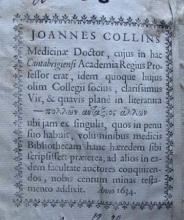John Collins (ca. 1576-1634)
John Collins graduated BA from St Johns in 1596 and MA in 1599. He then studied for his MD, spending several years abroad, graduating in 1608. In 1613 he was elected to a Fellowship at St John's, and subsequently became a censor (1615), anatomy lecturer (1624), and Regius Professor of Physick (1626). In his post as anatomy lecturer he established dissections as part of the curriculum, although he may not have accepted the important discovery of circulation by his colleague William Harvey. When plague broke out in Cambridge in 1630, Collins was one of the chief administrators appointed to prevent the spread of the disease, establishing a policy of isolation in a facility on Midsummer Common. Such a crisis appears to have had an impact on academic standards in the practice of medicine, for which Collins seems to have recieved some criticism. After his death in 1634, he was buried in the old chapel at St John's.
Collins's gift to the Library
Collins gave all his medical books to St John's, together with £100 for the purchase of further volumes. Over 300 volumes bearing his provenance are to be found in the Library. Among them are eight items of medical incunabula, the oldest being an edition of Savonarola's De pulsibus, urinis, et egestionibus from 1487. Some of these also demonstrate the influence of medieval Arabic medicine during the 15th and 16th centuries, examples being a Venetian edition of Razi's work from 1497, and a Lyon edition of Avicenna's Qanun (1498), with a panel-stamped binding. The books cover every aspect of contemporary medical knowledge, including surgery, pharmacology, and numerous illustrated works on anatomy. Among them are contemporary editions of works by such luminaries as Vesalius and Falloppio.
Provenance markings
The books given by Collins bear a book label detailing his bequest. Translated it reads:
John Collins Doctor, and Regius Professor of Medicine at the University of Cambridge, and sometime Fellow of this College, a most distinguished man, and plainly in all learning "worth more than several other men" when he made this Library heir to his medical books, which he held in store: moreoever, by his will he left us 100 pounds to acquire other authors on the same subject. In the year 1634.
